Sugar plantations, Chemical Plants, COVID-19

The chemical plants in Cancer Alley are built where there once were sugar plantations. Descendants of enslaved communities still live nearby.

The chemical plants in Cancer Alley are built where there once were sugar plantations. Descendants of enslaved communities still live nearby.

Join us for the Disaster STS Network’s Fall 2021 virtual tour of Louisiana's Cancer Alley, a corridor of chemical plants along the Mississippi River between Baton Rouge and New Orleans with shockin
The main hazard of this artifact is the chemically polluted waters of the Passiac River and its effects on the marine life. Furthermore, it ish from the river are typically eaten by the locals. The main form of precaution exercised to avoid this health hazard would be the fish exchange tents which have been set up for locals to use exchange their catches from the Passaic with farm raised tilapia.
The Minister of Home Affairs acts as the President, and the Vice Chairman of the NDMA (National Disaster Management Authority) acts as Vice President. The body of the organiation is comprised of 42 members including secretaries of nodal Ministries and Departments of Government of India and State Governments, the heads of national scientific, research and technical organizations, and eminent scientists and practioners. The governing body of the organization, which runs its day to day operations, is comprised of 16 members, and is chaired by the Vice Chairman of the NDMA, with the Secretary of Home Affairs acting as the Vice President.

The Disaster Management Act of 2005 constitutes the responsibilites of the NIDM to be human resource development, capacity building, training, research, documentation and policy advocacy in the field of disaster management. The organization aims to promote disaster management as a high priority in the national goverment. They also aspire to create "a culture of prevention" pertaining to disasters that involves all stakeholders.
Vulnerability and resilience in this artifact are defined by the high concentration of child poverty in Essex County. They are measured using the Census from 2000 and 2015 which show how there is a trend in the percentage of children who expereince poverty within the county. Majority of the children living in poverty are currently living in heavilyu concentrated poverty neighborhoods like Newark, Irvington, and the Oranges. Although the affluent town of Milburn is nearby, it is unclear how these children continue to live below the poverty line in Newark even though the towns are only 6 miles apart.
The hazard in this artifact is in relation to the polluted water system throughout urban New Jersey areas. The Passaic Valley Sewerage Commission and the D.E.P are working together to create new infrastructure upgrades to the local sewer systems. This long term plan will help limit the amount of toxic waste that runs off into the drinking water for surrounding urban communities.